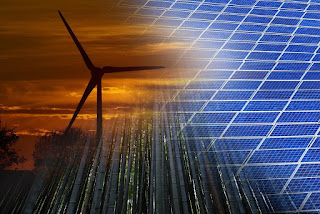German Renewable Energy Act (EEG Novelle 2021) - Considerable Changes Proposed
It has been the central backbone of Germany`s energy turnaround, the Renewable Energy Act (Erneuerbare Energien Gesetz). Enacted in 2001, it survived several amendments and revisions, changing from a feed-in tariff regime to a, specific German, feed-in premium modell. The current EEG stems from 2017 and by that time some fundamental changes were made to the system, as discussed on this blog. Now the german government decided to, once again, amend the EEG to accelerate the faltering energy turnaround. The new EEG amendments (so called EEG Novelle 2021) shall come into force on 1 January 2021. By 2030 65 % of electricity in Germany shall come from renewable sources and by 2050 the share will be 100%. This blog entry critically reflects upon the main amendments to the EEG that the government proposes and identifies four crunchpoints.
At a meeting on Wednesday 23 September 2020 the German government decided to propose to the parliament (Bundestag) a so called EEG Novelle 2021, featuring the new 2030 and 2050 goals for renewable electricity. This way of amending laws is a standard procedure in the German legal system. While the government proposal is rarely the final outcome of the legislative process it is worthwhile to take a look at the proposed changes, as the key pillars are unlikely to change. So what is being proposed and where are the crunchpoints?
What happens to the pioneer systems that can still run?
The first German EEG came into being by March 2000 and triggered what became known around the world as `Energiewende´ - the massive increase of electricity produced from renewable energy installations. For 20 years, these first pioneer windmills and solar-panels have been subsidized by fixed feed-in tarifffs that were guaranteed for 20 years. From 2021 onwards these guarantees will cease and the debate in the German government about what comes next for those installations that are technically still able to run for some years has been vicious. Positions ranged from that of the Conservative Party, CDU, which essentially did not want any subsequent regulation or support mechanism, to that of the Social-Democratic Party, SPD, which wants to enable a `second life´for these installations by installing a subsequent support mechanism that comes into effect after the inital EEG-Förderung (Support Scheme under the Renewable Energy Act) expired.
Repowering - What happens to those that can no longer run?
Closely linked to that debate is the second crunchpoint: what happens to those windmills, solar panels etc. that are now nearing the end of their technical lifespan. It is clear that those need to be decommissioned and that in and of its own is a considerable challenge (for details see: Fleming, R., Más, H. F., & Nieuwenhout, C. T. (2018). Wind Farm Waste – Emerging Issues with Decommissioning and Waste Regulation in the EU, Denmark and the United Kingdom. OGEL, 2018(2).)
The question for many of those, however, is whether or not these old installations may be replaced with new, more powerful once at the exact same spot. This is called repowering. From a legal point of view the question is in particular whether new licences are required and if feed-in tariffs that have been agreed for the old installations could be assigned to the new installations at the same place. This has been highly controversial due to several reservations concerning public acceptance of bigger installations. At the same time, however, it seems almost unavoidable, considering the recent sharpening of climate goals at EU level, which will be binding for Germany and need to be translated into national measures.
Increasing Expansion Targets
This debate about sharpened EU climate goals forms the background to a further crunchpoint. Under the new system of the EEG 2017, the state provides certain renewable energy expansion targets for each form of renewable energy in Germany. Trade unions and environmental organizations are lobbying hard for an increase of the expansion targets. This is a debate about § 4 EEG. According to a first ministerial draft of the bill the expansion targets that are laid-out in § 4 EEG shall be amended as follows. For onshore wind an increase of installed capacity to 71 Gigawatt in 2030 shall be reached. For offshore wind 20 Gigawatt by 2030 have been proposed in the first ministerial draft of the bill. In the final version now the law is simply making reference to the `wind-energy at sea - Act, that shall be presented tomorrow. For solar panels 100 Gigawatte installed capacity by 2030 is anticipated and for biomass 8400 Megawatt installed capacity by 2030 (see page 13 Referentenentwurf). This was considred insufficent by environmental organizations.
Coordination Between Federal Government, States and Municipalities
The final crunchpoint concerns the coordination between Bund, Länder and Gemeinden. This is of particular importance, given that certain municipalities in the past tried to foil the renewable energy expansion aims of the higher levels and occassionally adopted a NIMBY-policy. For instance, they did not allocate space in their municipal spatial plans for new renewable energy installations. The first ministerial draft of the bill did little to resolve that. It merely provides for increased reporting duties. A new § 99 EEG shall create an annual reporting duty from the Länder to the Bund, by which the Länder shall inform the responsible economic ministry of the federal government about appropriate new spaces for additional renewable energy installations (p. 147 Referentenentwurf). In the draft bill this has been broadened to §§ 97-99 EEG 2021. IN addition to the initial draft a coordination committee shall be created to check and monitor free spaces and allocation of these for renewable energy installations more closely, together with some other additional measures (p. 157 Draft Bill).




Comments
Post a Comment